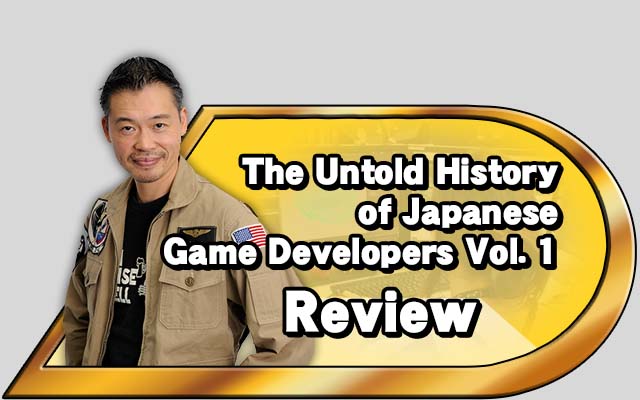
NOTE: There are two Johns referenced in this article. There is John, the patron and John Szczepaniak, the author.
After John graciously supported Source Gaming’s Patreon, I asked him if there was anything he would like to see me discussed on Source Gaming. He suggested that I write a review of The Untold History of Japanese Game Developers Vol. 1 and 2. I’m still working through volume 1, but I’m at a point where I can fairly review the contents.
Let me just say this: I love this book. This is exactly the kind of stuff that regular readers of Source Gaming would enjoy. John Szczepaniak does a great job tracking down the sources and getting comments from people involved in various aspects of game development. There’s programmers, artists and even an interview about game preservation in Japan. There’s a lot of neat little tidbits within these interviews and I strongly recommend readers to pick it up. There’s also a DVD with footage that might be worth it to check out. The Gold edition of The Untold History of Japanese Game Developers Vol. 1 includes timestamps of all the segments in the DVD, and is something I’m interested in seeing.
In a way, I’m a bit reminded of the work Brave Wave has done with video game music. In particular, I’d suggest listening to Wavelength 01, which discusses the origins of the project. In both instances, we have people reaching out to these creators, who were almost forgotten, despite having created classics that we treasure. Preserving video games and the history that goes along with them is a very important task, and one that we need to encourage as a community. We are already losing a lot of history every day as obscure titles fades into non-existence, and information gets dillulated by rumors and unsourced information. I would like to really applaud Mr. Szczepaniak’ and his team’s efforts.

Image Source: Hardcore Gaming 101
Volume 1 offers over 30 interviews! Here are some of them:
Keiji Inafune (Mega Man, Mighty No.9)
ZUN (Touhou shooters)
Hitoshi Yoneda (Cover artist, most famous for his Phantasy Star II cover)
Tatsuo Nomura (Google software engineer, worked on the Dragon Quest/ Pokemon April Fools changes)
Suikoden Chapter (Konami unreleased games, Suikoden trivia, and more)
Toru Hidaka (Enix programmer.)
Joseph Redon (Game Preservation Society. Discusses the group, challenges of preserving games, new laws.)
QtQ (On Japanese gaming and arcade culture.)
So the book offers a look at a wide range of topics. Personally, I was very interested in learning more about the Game Preservation Society, as I’ve been thinking about how to preserve games since I conducted a Straight from the Source interview with LuigiBlood. From the interview in the book, I learned that there are various challenges besides getting access to the materials. There’s also financial and volunteer support issues, and the need to navigate laws. Gaming preservation is not really seen as essential right now, even though a lot of the older media will eventually decay. Furthermore, game preservation requires a lot of breaking DRM, and other copyright protection. GPS has the right to preserve games as they “are not making copies. It’s just like scanning documents”.
Joseph Redon suggests there are 75,000+ Japanese made games (commercially) not including doujin and smartphone games. The Game Preservation Society has been working on an internal database which will eventually be made public. However, 20%-30% of computer games are already lost.

Image Source: Video Game Music Online
The interview with ZUN was pretty neat. There’s not a lot of English interviews with ZUN because he is so reclusive, so reading ZUN’s thoughts on Touhou was interesting. I used to think ZUN didn’t really like foreigners, but that’s not the impression I get from reading this interview. I think ZUN’s approach to handling his games and IP is pretty interesting, and I would highly suggest fans of Touhou to check out this interview.
All in all, there is a lot of history in this book, and I think the format of it is great. I enjoyed most of the questions and the interactions between the interviewer and interviewee. It definitely inspires me on how to conduct interviews with content creators moving forward. Thanks again to John (the backer) for his suggestion!
You can find out more information, plus links to Amazon to purchase this book on Hardcore Gaming 101.
- Smash Ultimate Development Timeline - May 16, 2020
- Straight from the Source: Koji Igarashi on Castlevania in Smash, Bloodstained - October 16, 2018
- Sakurai Discusses Isabelle, Echoes, and Newcomers - September 26, 2018










The book looks pretty interesting and I wish more people would try this kind of thing (tracking down old developers of games and interviewing them).
Then again, the author is a bit crazy. http://versusjs.blogspot.com/